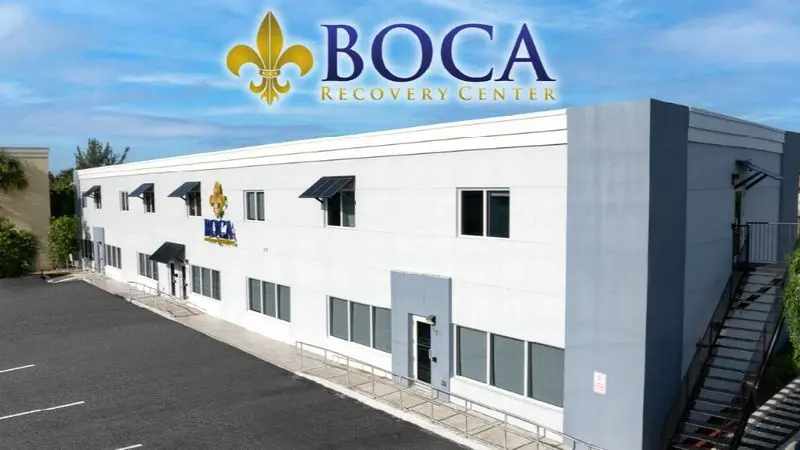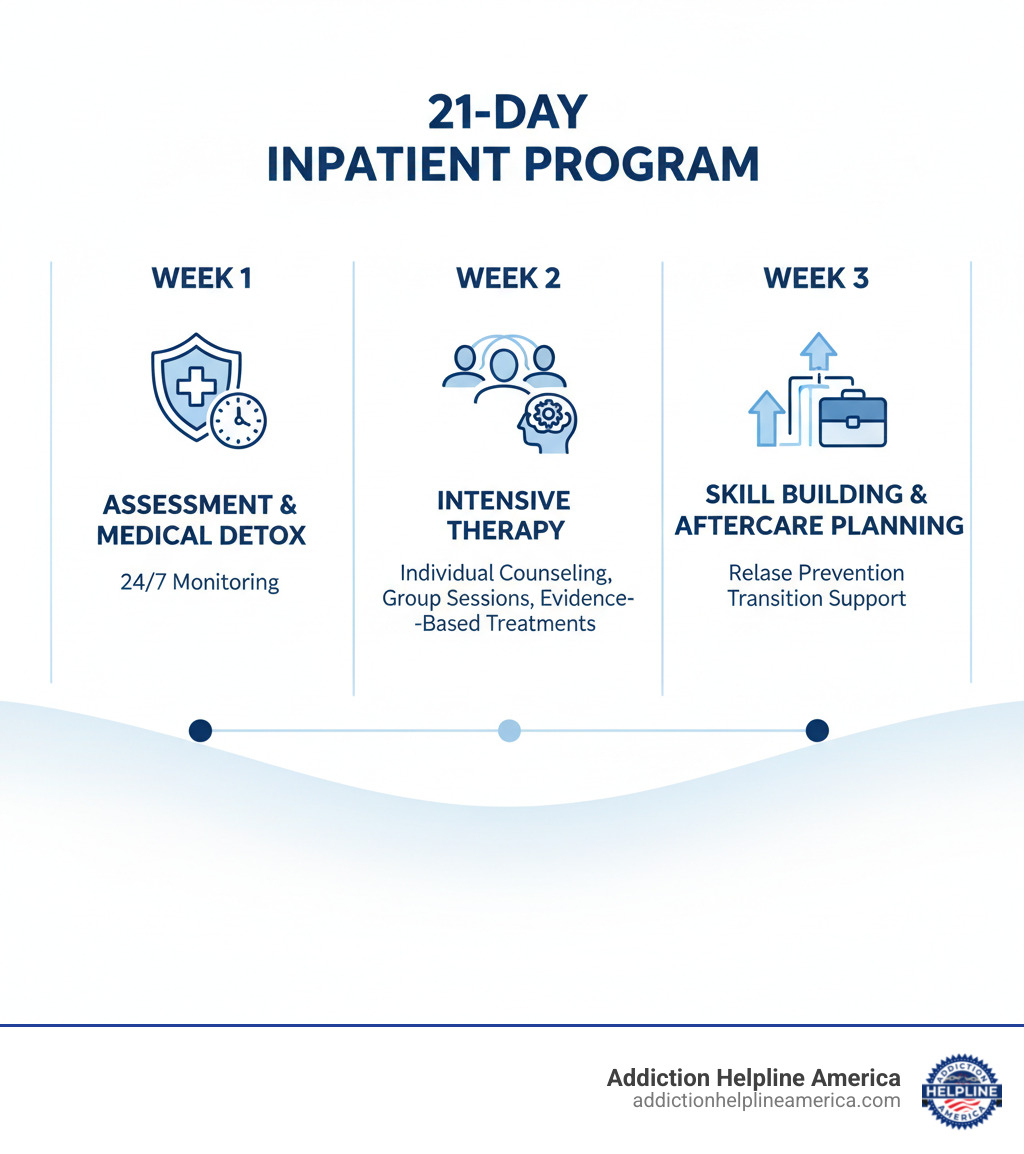
Understanding 21-Day Inpatient Programs: Your Questions Answered
Searching for a 21 day inpatient program near me means you’re looking for intensive, round-the-clock addiction treatment in a residential setting over three weeks. If you’re feeling overwhelmed and desperate for answers, know that there is hope. Here’s what you need to know:
Quick Guide to Finding a 21-Day Inpatient Program:
- What it is: Live-in treatment with 24/7 medical supervision and structured therapy.
- Average cost: Approximately $12,075 ($575 per day).
- Who it helps: Those with mild-to-moderate substance use disorders who need intensive care but can’t commit to longer stays.
- How to find one: Search treatment directories like SAMHSA, verify insurance, and check facility accreditations (JCAHO, CARF).
- What’s included: Medical detox, individual and group therapy, relapse prevention, and aftercare planning.
A 21-day inpatient program offers a powerful middle ground. It’s long enough to detox safely and build a foundation for recovery, but short enough to avoid putting your life on hold. The 2019 Treatment Episode Data Set shows that hospital-based inpatient programs averaged 21 days, making this a clinically recognized timeframe for stabilization.
These three weeks provide intensive, focused care away from daily triggers. You’ll get medical supervision, engage in evidence-based therapies like Cognitive Behavioral Therapy, and create a personalized aftercare plan. Short-term residential treatment has a completion rate of 56%, which is particularly effective for those who continue with aftercare.
However, not all programs are equal. Finding the right fit depends on location, staff, treatment philosophy, and insurance. At Addiction Helpline America, we guide individuals and families through this journey, connecting them with quality 21 day inpatient program near me options that fit their unique needs. Our team is here to help you find your recovery path—confidentially, compassionately, and free of charge.
Common 21 day inpatient program near me vocab:
What is a 21-Day Inpatient Rehab Program?
Inpatient rehab means you live at the treatment facility, receiving 24/7 structured care and medical support. It’s a chance to pause everyday life and focus completely on healing.
A 21 day inpatient program near me is a short-term intensive model. It packs a powerful punch in three weeks, providing enough time to detox safely, begin therapy, learn coping skills, and create a solid aftercare plan.
While many centers offer longer stays, a 21-day program has distinct advantages. According to the 2019 Treatment Episode Data Set (TEDS) from SAMHSA, the average stay for hospital-based inpatient programs was exactly 21 days, highlighting its effectiveness for initial stabilization.
The primary benefit of a shorter stay is less life disruption. Three weeks is a manageable timeframe that doesn’t require you to step away from your job, family, and responsibilities for months. This makes the decision to seek help feel more possible.
This duration is ideal for mild-to-moderate SUDs (substance use disorders). It’s also effective for those who have completed detox and need structured support, or for individuals in recovery who have had a slip and need an intensive reset. For more details, see our guide on 21 Day Inpatient Rehab Programs.
In short, 21 days is long enough to make real progress but short enough to fit into your life. It’s a focused approach that equips you with essential tools without requiring a long-term commitment.
What to Expect: A Look Inside a 21-Day Program
Stepping into a 21 day inpatient program near me means entering a world designed for your healing. Let’s explore what those three weeks look like.
A Typical Daily Schedule
Days follow a structured rhythm that replaces chaos with stability. A typical day includes:
- Mornings: Nutritious breakfast followed by meditation or yoga, then group therapy sessions where you connect with peers who understand your struggle.
- Afternoons: Individual counseling to address personal triggers, followed by educational workshops on the science of addiction and craving management. Recreational activities like art or exercise teach you to find joy without substances.
- Evenings: 12-step meetings (AA/NA) for stories of hope, followed by time for journaling and reflection.
This routine provides a predictable and supportive framework for recovery.
Therapies and Treatments Offered
Effective programs use evidence-based therapies. Cognitive Behavioral Therapy (CBT) is a cornerstone, helping you identify and change negative thought patterns that lead to substance use. Other key therapies include:
- Dialectical Behavior Therapy (DBT): Teaches emotional regulation and distress tolerance.
- Motivational Interviewing: Helps you find your own motivation for change.
- Holistic Therapies: Yoga, art therapy, and mindfulness teach healthy coping mechanisms.
Constant medical supervision is critical, especially during withdrawal. Medical staff monitor your health to ensure a safe detox process. For more on this, see our Detox Drug Treatment Guide Near Me.
Since nearly 80% of people in rehab have co-occurring mental health issues like anxiety or depression, quality programs offer dual-diagnosis care, treating both the addiction and the mental health condition simultaneously for a better outcome.
Who is a Good Candidate for a 21-day inpatient program near me?
This program length is highly effective for individuals with:
- Mild to moderate substance use disorder who need intensive care.
- A strong support system at home to aid in long-term recovery.
- Significant work or family commitments that make longer stays impossible.
- A need for a “recovery reset” after a relapse or to prevent one.
It’s also a great step-down level of care after completing medical detox. If you’re unsure if this is the right fit, Addiction Helpline America can provide a confidential assessment to help you decide on the best path forward.
Navigating the Logistics: Costs, Insurance, and Admissions
Understanding the practical details of rehab doesn’t have to be complicated. We can help you steer the costs, insurance, and admissions process step by step.
Understanding the Costs of a 21-Day Program
The average daily cost for inpatient rehab is about $575 per day, making a 21 day inpatient program near me around $12,075 total. While significant, this is often less than the long-term cost of active addiction. The Average Cost of Drug Rehab report provides more detail on this comparison.
Price is influenced by location, amenities (luxury vs. basic), and your specific medical needs, such as intensive detox or dual-diagnosis care. Don’t let the sticker price deter you. Payment options are available, including insurance coverage, facility financing plans, and sliding scale fees based on income. There are almost always ways to make treatment affordable.
Does Insurance Cover a 21-day inpatient program near me?
Yes, most insurance plans are required to cover addiction treatment. Thanks to the Mental Health Parity and Addiction Equity Act and the 2010 Affordable Care Act, substance use disorder services are considered essential health benefits.
This means your private insurance, Medicaid, or Medicare plan likely provides at least partial coverage. The key is understanding your specific benefits: your deductible, copayment, and whether a facility is in-network. Choosing an in-network provider can save you thousands. Some plans also require prior authorization.
Navigating this can be confusing. Addiction Helpline America can verify your insurance benefits for you at no cost. We’ll contact your provider and explain your coverage in plain English, so you know exactly what to expect financially.
The Admissions Process Explained
Getting admitted is a straightforward process designed to get you help quickly.
- Initial Phone Call: A confidential conversation to discuss your situation and determine if a 21-day program is a good fit.
- Clinical Assessment: A licensed professional conducts a comprehensive evaluation of your addiction severity, medical needs, and any co-occurring mental health conditions.
- Insurance Verification: While you’re being assessed, our team confirms your benefits and out-of-pocket costs, or discusses other payment options.
- Personalized Plan: The clinical team develops a custom treatment plan based on your evaluation.
- Logistics: We can help coordinate travel and provide a list of what to pack (and what to leave at home). For more tips, see our guide on Choosing the Right Rehab Facility.
The goal is to make it as easy as possible for you to get the help you need.
How to Compare and Find the Best 21-Day Inpatient Program Near Me
Choosing the best 21 day inpatient program near me can feel overwhelming. To make an informed decision, focus on these five key areas:
1. Accreditation and Licensing
Accreditation is your assurance of quality. Look for facilities accredited by The Joint Commission (JCAHO) or CARF (Commission on Accreditation of Rehabilitation Facilities). These signify that a program meets high national standards for care and safety. Also, confirm the facility holds all necessary state licenses, ensuring it operates legally.
2. Treatment Philosophy and Therapies
A program’s effectiveness depends on its treatment approach. Seek programs using evidence-based models like Cognitive Behavioral Therapy (CBT) and Dialectical Behavior Therapy (DBT). Consider if they offer holistic options like yoga or art therapy. If you have a co-occurring mental health condition (dual diagnosis) or are a veteran, look for specialized tracks that meet your needs. Our guide on Inpatient vs. Outpatient Rehab can clarify different care levels.
3. Staff Qualifications and Expertise
The quality of staff determines the quality of care. A reputable 21 day inpatient program near me should have a multidisciplinary team of licensed doctors, nurses, certified counselors, and therapists. A low patient-to-staff ratio is a good sign, as it suggests more personalized attention. The team should be equipped to handle medical detox and psychiatric care.
4. Aftercare and Relapse Prevention Planning
Recovery is a lifelong journey, and a 21-day program is just the start. A good program emphasizes aftercare planning from day one, which is crucial for a successful transition, as noted in research on Transitioning From Detoxification to Substance Use Disorder Treatment. Robust aftercare includes:
- Outpatient Programs: Continued therapy through IOP or PHP.
- Sober Living Homes: A supportive, substance-free living environment.
- Support Groups: Connections to communities like AA, NA, or SMART Recovery.
- Alumni Programs: Ongoing connection to the treatment center and peers.
5. Location and Facility Environment
Consider the pros and cons of staying local versus traveling for rehab. A new environment can offer a break from triggers. Evaluate the facility itself for comfort, safety, and a supportive atmosphere. While not essential, amenities like a gym or outdoor spaces can improve the experience. Our Find a Rehab: The Ultimate Guide offers more detailed insights.
Frequently Asked Questions about 21-Day Inpatient Programs
It’s normal to have questions when considering a 21 day inpatient program near me. Here are answers to the most common ones we hear.
Can you fully recover in just 21 days?
No, a 21-day program is not a cure for addiction, which is a chronic condition requiring ongoing management. However, it provides a powerful foundation for recovery. In these three weeks, you will achieve stabilization, learn essential coping skills through intensive therapy, and develop strategies to manage triggers. Success hinges on your commitment to aftercare, such as outpatient therapy and support groups. A 21 day inpatient program near me is a vital first step on a lifelong journey, but it is not the only step.
What should I pack for a 21-day rehab stay?
Focus on comfort and avoid distractions. Key items include:
- Comfortable clothes: Casual, layered outfits appropriate for therapy and light exercise. Avoid clothing with drug or alcohol references.
- Alcohol-free toiletries: Ensure all products like mouthwash and shampoo are alcohol-free to prevent triggers.
- Personal items: A journal, approved books, and photos of loved ones can be comforting. Bring any prescribed medications in their original bottles.
Always ask the facility for its specific list of what to bring and what is prohibited. Most restrict electronics, outside food, and anything that could compromise safety.
Can my family visit me during the program?
Most 21 day inpatient program near me options encourage family involvement. Policies vary, but generally include:
- Scheduled visiting hours: Designated times for loved ones to visit in a structured environment.
- Family therapy sessions: These sessions are designed to heal relationships, improve communication, and educate family members about addiction.
- Family education workshops: Teaches loved ones how to support your recovery without enabling.
Be aware of a potential initial “blackout period” for the first few days, which allows you to settle in without distractions. Always clarify the specific visitation policy with the facility beforehand.
Your Next Step Towards a Healthier Future
You’ve taken a courageous step by learning about what a 21 day inpatient program near me can do for you. This focused path to recovery provides the intensive care needed to break free from addiction while minimizing disruption to your life. It’s not a cure, but it is a powerful beginning that provides the tools and support to build a better future.
Choosing the right program is a personal decision. Factors like accreditation, treatment philosophy, staff qualifications, and aftercare planning are crucial to finding the best fit for your unique situation. You don’t have to figure this out alone.
At Addiction Helpline America, we provide free, confidential, and personalized guidance. We’ve helped thousands find the right program from our network of quality treatment centers. We can verify your insurance, answer your questions, and support you through the admissions process. Our goal is to find the facility that truly fits your needs.
Recovery is a journey that begins with this first step and continues with a strong aftercare plan, connecting you to ongoing support like the various Types of Treatment Programs.
Let us be your trusted partner in turning research into action and action into lasting recovery. You’ve already shown incredible strength; let us help you take the next step.
Our helpline is 100%
free & confidential
If you or someone you care about is struggling with drug or alcohol addiction, we can help you explore your recovery options. Don’t face this challenge alone—seek support from us.
Programs
Resources
Will my insurance
cover addiction
treatment?
We're ready to help
Find the best
drug or alcohol treatment
center
Are you or a loved one struggling with addiction? Call today to speak to a treatment expert.
















